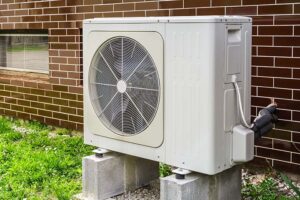Table of Contents
Within the United Kingdom, heat pumps have been on the rise as a more effective means of heating one’s house, than the gas boilers. Theoretically, heat pumps use electrical energy to transfer heat to a house from the ground, outer atmosphere or even water.
Not just that, heat pumps can also work on solar panels – modern and renewable sources of energy. This has become eminent that heat pumps are the future of home heating. But whether it’s a myth or a fact? In this blog, we will try to explore why heat pumps are getting fame and if they are truly the future.
What is a Heat Pump?
A modern heating technology that transfers heat from one place (home exterior) to another (home interior) is called a heat pump. It transfers heat from the ground or outside air to living rooms inside homes. Despite the cold climate, these modern heating systems can extract warm air. Then, it passes through the compressor at high pressure to increase temperature.
It can provide warm air or heat water to make your living cosy throughout the winter. Not just that, heat pumps can work in reverse during summer, transferring heat outside your house to keep the interior cold. These heating systems are an energy-efficient choice since they use less energy than conventional heating systems.
Air Source Heat Pump Grants
Working Mechanism of Heat Pump Technology
Heat pumps work on the principle of extracting heat energy from the air around them. Even when it’s cold, there is still heat present in the ground or air.
The heat pump’s function is to take this heat and compress it which raises its temperature. Warm air can then be pumped into the whole house. Although some electricity is required to carry out the process, energy usage is less than traditional heating methods.
To understand more about how heat pumps operate during colder months, check out our article on How Does Heat Pump Work In Winter?.
Highlighting The Future of Heat Pumps
There is much more from the UK government to use heat pumps. This is because heat pumps can combat climate change. Gas boilers use up fossil fuels, while heat pumps use electricity to run and it can be produced through renewable sources like sun.
Within the United Kingdom, heat pumps have been on the rise as a more effective heating system, than the gas boilers. To explain, heat pumps use electrical energy to transfer heat to a house from the ground, outer atmosphere or even water.
Benefits of Heat Pumps
- Energy-efficient: Heat pumps are more efficient as they consume very little energy compared to normal boilers.
- Environmentally friendly: Since they don’t burn fossil fuels like gas or oil, heat pumps are planet safe.
- Lower running costs: Heat pumps are especially for those who are not eligible for any grants expensive on upfront cost however energy efficiency might help in reducing the energy bills in the long run.
- Long lifespan: Heat pumps can last up to 25 years, which is longer than that of most traditional boilers.
- Dual function: They can heat or cool your house creating suitable temperatures any time of the year.
- Low maintenance: Servicing and repairs of heat pumps are less as compared to gas boilers hence low expenditure on repairs.
- Support for renewable energy: Solar panels for example can be used to energise them. This can contribute more in cutting down the emissions.
- Government grants: The government has a very big mandate to control the emissions of gases into the atmosphere. Hence, they have created policies such as the Boiler Upgrade Scheme or ECO4 to help reduce the cost of installation.
Are They Expensive?
The only disadvantage of heat pumps is the high installation cost. The price of a heat pump system can be between £7,000 and £13,000. This may cause financial burden on many homeowners.
Especially those considering the installation of this system will drain their pocket. However, the cost is mitigated by grants extended to the eligible households in the United Kingdom.
These offsets the cost of installation, thus these heat pumps are less expensive for the homeowners on benefits. Over a period of time, the reduction in energy bills will assist in paying back the maintenance costs.
Heat Pumps and the UK Climate
Heat pumps, especially the air source heat pumps, are compatible with the climate of the United Kingdom. Considering the fact that air source heat pumps can extract heat from air even at -15 degrees Celsius, they perform effectively even in very cold regions.
In other colder regions, ground source heat pumps which use heat from the ground are also effective. In the majority of UK houses, heat pumps may function efficiently with the appropriate installation.
Challenges of Heat Pumps
Alongside the benefits, heat pumps have a few drawbacks. First, the installation might be complicated and often entails finding an appropriate place for the outdoor units and modifying the heating system of the house.
Heat pumps might be less efficient in accommodating certain heat demands in certain houses. If the house has a high heat loss coefficient, i.e., poorly insulated. Under such circumstances, the inefficiency of the heating pump will be witnessed since it has to keep running continuously.
As a result, the majority of the heat is lost from your home. However, this problem can be controlled by the application of proper heat insulation.
Are Heat Pumps the Only Solution?
Air source heating is not the only possibility for eco-friendly home heating. Alternatives include hydrogen boilers or electrical radiators and many people may be inclined towards these at present.
Although still at the research stage, hydrogen boilers could be a low emissions technology in the future. As for electric radiators, they are within reach, but mostly, they are less efficient in terms of energy consumption compared to heat pumps.
Comparing Heat Pumps to Gas Boilers
For a number of decades, gas boilers have likely been the most popular heating method in the UK. However, they contribute to greenhouse gas emissions by burning fossil fuels. Heat pumps are different as they operate on electric and solar energy, which is capable of being sourced from clean energy.
Hence, they are more favourable than gas boilers in this case. Initial costs of gas boiler installations are low, however the running costs may differ if gas prices increase. Heat pumps, on the other hand, provide benefits with low energy bills because of using solar panels.
Government Grants for Heat Pumps
The UK government is providing support to households living in fuel-poverty. They offer grants to get free air-to-water heat pumps with solar panels. The ECO4 scheme is aimed at providing grants to mitigate the heat pump installation expenses.
This scheme falls within the government’s strategy to eliminate inefficient heating systems including boilers by 2035. Through provision of these government grants, the management seeks to enable more households to switch to heat pumps.
Are Heat Pumps Suitable for Every Home?
Heat pumps have their merits but may not suit every home. For instance, they do well in conventional homes that are well insulated since insulation helps to maintain the temperature in the house.
Homes with large stretches of land are perfect homes for ground source heat pumps since the heat pumps have underground pipes that require space outside.
On the contrary, heat pump systems might be problematic in the installation for smaller houses and apartments. In this situation, any other low-carbon alternatives may be more viable.
Will Heat Pumps Replace Gas Boilers?
Numerous energy experts predict that heat pumps will play a significant role in the future. In the United Kingdom’s initiative to mitigate carbon emissions, it is highly likely that gas boilers will gradually be banned.
On the other hand, heat pumps will not be a replacement for gas boilers any time soon. Since boiler technology is also developing, some households could still be dependent on alternative technologies, such as hydrogen boilers.
The Future of Home Heating in the UK
In addition to making every house more energy efficient, the UK government will concentrate on lowering carbon emissions. One of the most promising technologies that can make that happen is the heat pump.
Those who can’t afford can apply for Air source heat pump grants if they are on benefits due to earning low income. For instance, on 21st September 2023, Boiler Upgrade Scheme (BUS) grants were extended from £5000 to £7500 for Air Source Heat Pumps. Thus, it might be expected that they extend it further in the future to speed-up the installation and achieve set goals.
While the ECO4 grants cover the complete cost of installation even if it exceeds £7500. Hence, we can say that more individuals will be shifting to heat pumps in the coming years.
Nevertheless, the changeover to heat pumps is not going to be instant and other technologies for instance hydrogen boilers are also likely to be realised.
Are Heat Pumps the Future?
Heat pumps are a vital component of the UK’s future since they provide a clean, energy-efficient means of heating houses. They contribute to cutting energy costs and carbon emissions. However, not all homes can install heat pumps, and they are not the only choice.
With government support and technology developments, heat pumps are expected to become more common in the UK. Even if they may not completely replace gas boilers just yet, they are definitely a step in the right way towards a greener future.
In conclusion, heat pumps seem to be a serious candidate for the UK’s home heating system of the future. Initiatives from the government help them. Their applicability varies per house, however, and other technologies could possibly play a role in home heating in the future.
Frequently Asked Questions
As per the United Nation and the UK government plan, carbon emission has to be reduced to zero by 2050. To achieve this goal, the British government will most likely replace all boilers with these new energy-efficient heat pumps.
Government ECO4 scheme covers 100% cost of heat pump replacement. It may include the cost of buying new heat pumps, the cost of removing the back boiler and installation fee of air source heat pumps.
Many homes are old and not well insulated. Gas boilers are cheaper and more common. People don’t know much about heat pumps.
Heat pumps can be expensive. They need a well-insulated home. They heat up slower than gas boilers. Electricity can make them costly to run.



